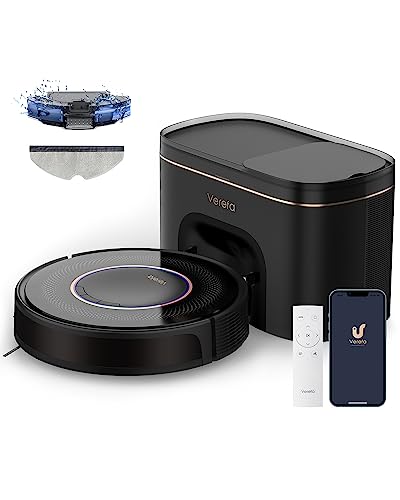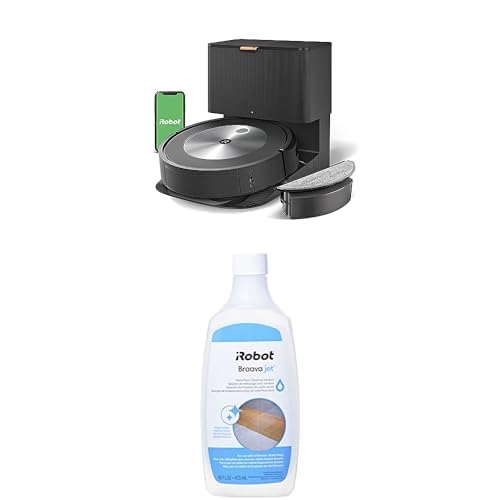
A Robot Vacuum With a Self-Empting Base Adds Value

A self-emptying base for your vacuum is an excellent accessory to your robot vacuum. It's hands-free, which is particularly beneficial for those with allergies because touching dirt and pet hair is not ideal.
You can also save a lot of your time by not having the need to empty the bin. It's not without its flaws.
1. It is easier to empty
Many
robot vacuum mop self empty vacuums come with dustbins that must be empty manually at the end of each cleaning cycle. This isn't a issue for everyone, but those who have allergies or simply do not have the time to keep up with emptying the bin will appreciate a self-emptying base. These upgraded versions of robotics are paired with docking stations which remove and clean the waste from their storage bags.
They are less likely to release fine particles of dust into the air. You don't need to be concerned about dust getting on your hands. They're also designed to be more durable and sturdy and have a large capacity to hold a lot of dirt and debris in between emptyings.
The downside of a robot equipped with a self-emptying basis is that it will usually cost more than those without one. Even though the price range for this technology has expanded as more brands have offered it, it adds a significant sum to the overall bill. It is crucial to weigh the pros and cons before deciding if the added features are worth the extra expense.
It all boils down to the individual wants and needs. If you suffer from allergies or simply need to cut down on time, a vacuum that self-empties is worth the cost. If you're on a tight budget or don't have much space in your home, you may prefer one that does not have this feature. In that case the basic robot vacuum is sufficient for most homes. This is particularly helpful in areas that are full of messes, such as kitchen floors, as food particles are bound to fall.
2. You can save time and effort by reducing front end efforts
Robot vacuums do a good job of removing small dust, messes and debris from the home. The dust bins that are connected to them have a limited capacity and must be cleaned each cleaning. It can be a hassle when you use it frequently. A self-emptying base for your
robot vacuum with self emptying vacuum is an excellent option. This feature lets you bypass the dustbin completely and connect the robot to a large storage bin that it can automatically empty and clean when full. This will save you time and effort - and helps to prevent clogs in the bin which can cause your robot to stink and lose suction.
It could be beneficial if you have pets or children in your home, who might bring dust or crumbs into the house. It could also be helpful those living at home who suffer from allergies that could be caused by dust and pet hair reintroductions.
A robotic vacuum that has self-emptying bases typically costs more than one without it however, the extra expense is well worth it in our opinion. Especially if you want to be able to create the schedule of your
best robot vacuum for hardwood floors self empty and use voice assistants to control it. Other features to look out for are a mapping feature as well as no-go areas (older models have strips that you put around the zone you want your robot to stay clear of), and real-time tracking with its app.
There are many great options for a brand new robotic vacuum cleaner, but the
best robot vacuum for hardwood floors self empty one depends on your needs as well as your budget. Some of the most highly rated robots on the market can even be used as mops and are capable of object recognition to avoid those annoying wires that are rogue.
3. More interventions are not required.
A robotic vacuum cleaner that automatically empties is a convenience that is worth the money, especially for those who are occupied and have a lot of work to do. It will save you time by decreasing the amount of time spent emptying and cleaning the bin. This allows the machine to be used more frequently and more efficiently.
The majority of robotic vacuums can create 2D maps with sensors such as lidar or DToF (similar to the technology used in autonomous cars). This allows them to map the most efficient path through a house, and even name the rooms by recognizing the different types of furniture. This lets them navigate a room efficiently and without becoming lost or confused.
Many entry-level robots need a lot of attention from their owners. This means regular emptying of their tiny dustbins, detangling brushes and preventing them overstuffing and spitting out the debris once more. This can be annoying, especially when you have children or pets, and a self-emptying base can significantly prolong the life of the robot by reducing the amount of maintenance required.
Furthermore, many self-emptying robots have stable docks that won't bump or move when the vacuum climbs onto them this is a huge benefit for those with limited storage space in their homes. The base will be bigger and heavier, which is an excellent thing. The iRobot Roomba i7 Clean Base for instance, has a footprint that measures 19.4 inches by 16.5 inches. This may be too big for some areas. This can also be a problem if you plan to keep the robot and its base out in the open, where it will be visible.
4. Less effort on your back
You can cut down on time and effort by using a robot vacuum that automatically emptys itself after each cleaning cycle. You can also use it more often, making your home cleaner.
If you're managing kids working, household chores and other chores, the more hands-free your Robot Vacuum With Self Empty Base,
Ugzhnkchr.Ru, vacuum will be the more efficient. Unfortunately, the majority of robotic vacuums come with tiny dustbins that require you to pause during your chores to empty them before they complete their work. This can be a huge problem, particularly for homes with carpeting that is high-pile or a lot of furniture that requires careful manipulation to get an effective clean.
The iRobot Roomba j7 has a large base that can hold several cleaning sessions worth of dirt and debris, which means you don't have to empty it as often as you might with a normal robot. Its navigation is top-quality which means it is able to navigate around cables and objects that can entrap other robots we've examined.
To ensure that your robotic vacuum is as hands-free as you can You should get rid of all toys, blankets, and other clutter. You can program the vacuum to clean during an hour that does not interfere with your daily schedule, like the end of the day or after everyone has gone to bed. If your model doesn't include a boundary feature, you can create a "fling circle" by netting an area with your furniture. This will ensure that the robot is not from it.
5. Less noise
A vacuum cleaner that has self-emptying bases typically has an internal storage system to store dirt and debris, instead of throwing it into the trash like many. This stops dust and dander from being thrown into the air, which could be inhaled. This is important for those suffering from allergies.
This feature lets you run your robot cleaner much more frequently, as it doesn't require you to stop it during cleaning to empty the trash bin. This is a major benefit for busy parents trying to juggle children, work and other chores in their home and might not have the time to vacuum every day.
One of the major disadvantages of a robotic vacuum with a self-emptying dustbin is that it will create quite a bit of noise, particularly when it is transporting debris from the bot to its storage system. This can be loud and distracting to children and pets. It can affect your schedule for cleaning or cause you to skip using the robot.
A good robot with self-emptying bases should be quiet enough that you can operate in the background without worrying about disturbing the kids or disturbing your guests, especially if you're having guests at your home for dinner. We also test the noise level of the vacuum. We look for a vacuum that makes less than 65 decibels in a typical household setting. The Roborock MieleXV-21 scored well in our tests with a very low noise level, and its navigation is excellent for maneuvering through studios with lots of clutter and getting around objects that can easily derail other robots. It utilizes lidar mapping for room-specific cleaning and digital keep-out zones but it's not equipped with AI obstacle avoidance, meaning that it could get caught up on cables or even shoelaces and socks in the event that you don't pay attention.



